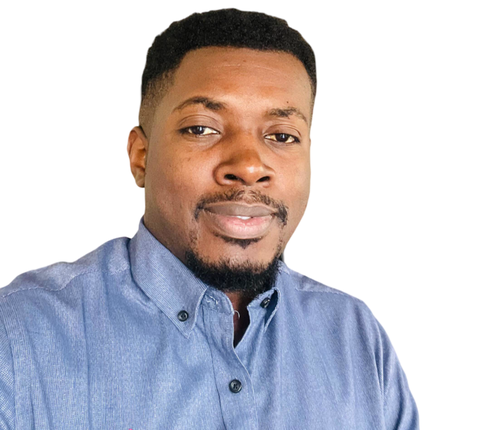Kulondwa Safari
Table of contents
- 1. What is the title of your dissertation? How did the idea come about to deal with this particular topic in your doctoral thesis?
- 2. Can you tell us how you got in touch with Professor Hornuf and how you convinced him to supervise your doctoral thesis?
- 3. What are the central research questions and which methods do you use to answer the questions?
- 4. In your opinion, what are the most exciting results of your recent paper so far and what implications can be drawn for policymakers?
1. What is the title of your dissertation? How did the idea come about to deal with this particular topic in your doctoral thesis?
I’m Kulondwa Safari, and my PhD thesis is on “Fintech and Financial Inclusion in Sub-Saharan Africa”. After completing my undergraduate degree in Economics at Université Evangélique en Afrique in Bukavu, DR Congo, I did an internship at the Central Bank of Congo, where I became fascinated by the digitalization of the financial system and policymaking for commercial banks and other financial institutions. While pursuing my master's at Kenyatta University in Kenya, I observed and appreciated the progress of the M-Pesa system and how it makes access to finance easier in Kenya. I have also travelled to various cities and remote areas in DR Congo, Burundi, Rwanda, Uganda, and Kenya, where many places still have limited access to financial services. My Phd topic came to mind as I seek to expand access to finance in Africa through various mobile fintech solutions, which are more affordable than traditional commercial banks, and improve existing mobile fintech systems. The findings from my PhD research will contribute to policymaking and help improve access to finance in countries with low levels of financial inclusion.
2. Can you tell us how you got in touch with Professor Hornuf and how you convinced him to supervise your doctoral thesis?
After completing my master’s in Kenya, I worked for two years in DR Congo as a teaching assistant at Université Evangélique en Afrique and as a consultant for various organizations. I felt the need to progress in research, and pursuing a PhD was the best path forward. In my country, it is rare to come across professors with publications in reputable journals in economics, finance, or business. There are few PhD programs in economics and business, and the quality of supervision is not very strong, as most professors are overburdened with excessive workloads due to their scarcity. As a result, I decided to seek PhD admission abroad, focusing on the United Kingdom, Germany, and the USA for their quality education. Without a network for a possible PhD supervisor recommendation, I had to rely on my CV, my Phd proposal and previous research output to convince someone to supervise me. I searched online for research chairs in these three countries which had research interests in fintech and finance. In February 2022, I sent PhD supervision requests to around 30 professors in the selected countries whose research outputs and areas of interest aligned with mine (fintech and finance). As expected, many of my requests went unanswered. However, I received about five responses from professors in Germany (2) and the United Kingdom (3).
Arranging financial support in the United Kingdom was challenging due to the high tuition fees. Of the two responses I received from Germany, one professor was interested but at full capacity for supervision. Fortunately, the other professor is one of the leading scholars in the field of fintech worldwide, Prof. Lars Hornuf. He accepted to discuss my Phd proposal with him in a Zoom meeting. After discussing on it, he provided comments and suggestions for revision. After I revised the proposal, he agreed to supervise me. To fund my PhD, I was confident I could secure a scholarship from either Brot für die Welt (being a partner of the University I worked for in DR Congo) or DAAD, or self-fund my PhD (not easy but could be possible with family support). I applied to Brot für die Welt and successfully obtained the scholarship. In January 2023, I moved to Germany to begin my PhD research.
3. What are the central research questions and which methods do you use to answer the questions?
My thesis has three central research questions:
- What are the drivers of mobile fintech service adoption in Sub-Saharan Africa? Prof. Dr. lars Hornuf and I recently answered this research question in a first journal publication in Research in International Business and Finance.
- What influences prospective entrepreneurs to venture into mobile money agent business?
- Why do African Small and Mid-sized Enterprises use fintech solutions as payment method?
4. In your opinion, what are the most exciting results of your recent paper so far and what implications can be drawn for policymakers?
My first paper under the title Mobile Fintech Adoption in Sub-Saharan Africa: A Systematic Literature Review and Meta-Analysis examines the drivers of mobile fintech service adoption in Sub-Saharan Africa, a region with the lowest financial inclusion rates in the world. We analyze the determinants of the use of mobile money, mobile banking, electronic wallets, and internet banking by summarizing the extensive empirical research through a systematic literature review. Based on a meta-analysis, we conclude that perceived ease of use and perceived usefulness are most important for users to adopt these fintech solutions. We also find a lack of research on how the supply side drives fintech adoption. Finally, we find large-scale field experiments to be underrepresented in the literature. We conclude that policymakers should focus on enhancing digital and financial literacy and setting standards for technology compatibility to create a supportive regulatory environment for wider mobile fintech adoption in Sub-Saharan Africa.
